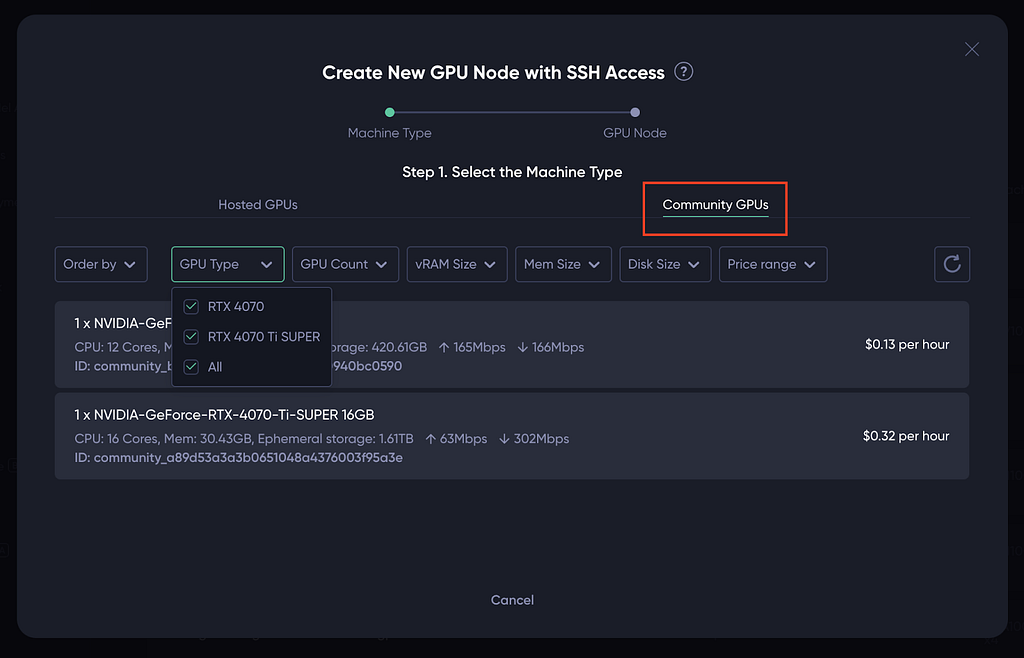Introducing EdgeCloud Hybrid: the next generation GPU marketplace for decentralized cloud computing
1
0

June 25, 2025 marks a defining milestone for Theta Network as we launch the beta version of EdgeCloud’s hybrid edge-cloud architecture, built to power the future of distributed computing.
Over the past few years, Theta has revolutionized decentralized video delivery and Web3 infrastructure. Now, we’re taking the next leap: unlocking high-performance, AI-ready compute infrastructure by combining the power of community-run edge nodes with traditional cloud GPUs — all orchestrated through one seamless platform.
The EdgeCloud beta release introduces a hybrid architecture designed to handle compute-intensive workloads through an intelligent orchestration layer that balances jobs between cloud-based GPU servers and Theta’s global network of community-run edge nodes.
EdgeCloud’s hybrid GPU infrastructure is used today by leading academic institutions to enhance AI research productivity, including Stanford University, Seoul National University, KAIST, the University of Oregon, Michigan State University, NTU Singapore, and more. Major sports and entertainment brands have adopted EdgeCloud as well such as the NBA’s Houston Rockets, NHL’s Vegas Golden Knights and New Jersey Devils, and MLS’ San Jose Earthquakes and Philadelphia Union.
What is Theta EdgeCloud?
Theta EdgeCloud is a decentralized marketplace that connects the supply and demand loop for GPU computing power. It empowers anyone with idle GPUs to contribute their resources and earn rewards, while providing developers and AI teams with a scalable, cost-efficient platform for running containerized workloads.
A core piece of the platform is the Theta EdgeCloud client node — a lightweight software package that enables community members to share their idle GPU capacity and participate in the growing EdgeCloud ecosystem. Node operators are rewarded in TFuel for executing compute tasks, with monthly payouts distributed between the 1st and 5th of each month, beginning August 1st. Rewards for both GPU node deployments and on-demand model inference jobs are calculated in USD and converted to TFuel based on the market exchange rate at the time of distribution.
To ensure a fair and dynamic pricing model, Theta EdgeCloud allows node operators (the supply side) to set their own hourly rental rates. Meanwhile, users (the demand side) can select nodes that meet their performance requirements and budget constraints when launching workloads. This market-driven approach helps keep GPU compute pricing competitive and transparent across the platform.
GPUs supported by EdgeCloud include NVIDIA 3070s, 4090s, all the way up to enterprise grade A100s and H100s. Despite their heterogeneity and varying specs, EdgeCloud ensures high-efficiency computation across GPU types through advanced job containerization and automatic failover logic.
Built for the Most Demanding Workloads
EdgeCloud isn’t just for video. It’s built to support any containerized computation, such as:
- AI inference and GenAI models (e.g., text-to-image, image-to-image, chatbot agents)
- Real-time video encoding and transcoding
- 3D rendering and animation pipelines
- GPU-intensive financial simulations and scientific research
Whether you’re a developer building the next AI agent, a researcher running GPU simulations, or a creator transcoding video at scale, EdgeCloud gives you decentralized, cost-efficient compute at your fingertips.
Key Beta Features
Launching June 25, 2025, the EdgeCloud Hybrid Beta includes features such as:
- Job orchestration across cloud and edge
- Optimized task allocation based on node capabilities
- Failover support for node reliability
- Developer API for job submission and analytics
These features are designed to make it easy for developers and enterprises to harness decentralized compute without sacrificing control or visibility. Future updates will include the ability to set job preferences and opt-outs for your node(s), and a real-time job completion analytics dashboard.
These enhancements will unlock even broader use cases across verticals like academia, private enterprise, professional sports, and esports.
Getting Started
Building on Theta’s robust developer ecosystem we’re providing the tools and APIs needed for any developer to create and scale with EdgeCloud. Whether you’re shipping an AI app or launching a distributed rendering platform, now’s the time to build. You can find instructions below, or check the Theta community EdgeCloud FAQs.
Supply Side — Contribute Your GPU
If you’d like to contribute your idle GPU resources by hosting a Theta EdgeCloud client, refer to the following resources for installation and usage:
- EdgeCloud Client Installation (Linux and Windows).
- EdgeCloud Client CLI Guide.
- EdgeCloud Client RPC API Reference.
Recommended hardware requirements:
- GPU: Nvidia GPU with at least 8GB vRAM and latest drivers, e.g. RTX 3090/4090 or A100/H100
- Operating system: Ubuntu 22.04 or greater on a bare metal installation, or Windows 10/11 for the Alpha preview testers
- Intel/AMD CPU with 4+ cores, 16GB+ RAM, 256GB+ free disk space
- 100 Mbps+ Internet connection up and down
Machines meeting the above specs will be much more likely to get high-reward jobs. Moreover, clients who are used to cloud services like AWS or GCP may come with high expectations, so it’s a good idea to aim for consistent uptime. When being used, the GPU will likely be running near full capacity, so make sure your internet connection, power supply, and cooling systems are in good shape.
Demand Side — Run Your Workloads
To run your containerized jobs on Theta EdgeCloud using GPUs contributed by the community, check out the guide below:

Get Ready for the Future of Compute
With EdgeCloud Beta, we’re redefining what’s possible at the intersection of decentralized networks and high-performance AI compute. It’s a new era — one where anyone, anywhere, can contribute and access scalable AI and GPU resources. The edge is just the beginning!
Introducing EdgeCloud Hybrid: the next generation GPU marketplace for decentralized cloud computing was originally published in Theta Network on Medium, where people are continuing the conversation by highlighting and responding to this story.
1
0
 Manage all your crypto, NFT and DeFi from one place
Manage all your crypto, NFT and DeFi from one placeSecurely connect the portfolio you’re using to start.





